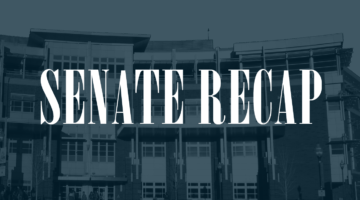
On Tuesday, Oct. 3, writer, director, actor and science Journalism advocate Alan Alda visited the Reynolds School of journalism to talk about the importance of communicating science accurately and effectively. During his 40 minute talk, he fielded questions from both professors and students from the journalism and science programs to help them better understand the importance of communicating their work effectively as well as how to communicate that work accurately in a way that engages the audience.
Alda is best known for his role as Capt. Benjamin Franklin ‘Hawkeye’ Pierce in the hit ’70s show “M*A*S*H*,” where he appeared in over 251 episodes over the course of 11 seasons. The series finale in 1983 still holds the record for the most-watched television series event ever aired at 105.9 million viewers.
Alda went on to host a show on PBS called “Scientific American Frontiers” from 1993 to 2005 where he interviewed over 600 scientists about their various fields of work, from climate change to astronomy. The show aired as a companion to the “Scientific American” magazine.
“I was always interested in science from the time I was a boy, but I never studied it formally,” Alda said in his speech, “I really have always loved science… I wanted to interview them [scientists] because I wanted to learn about their work from them in their own voice.”
In 2009, Alda founded the Alan Alda Center for Communicating Science, at Stony Brook University in New York.
“Effective science communication happens when we listen and connect,” Alda writes on the Alan Alda Center for Communicating Science website. “It happens when we use empathy. Communication is headed for success when we pay more attention to what the other person is understanding rather than focusing solely on what we want to say.”
Alda encouraged everyone attending his talk to ask him questions, he was eager to discuss the problems plaguing the growing disconnect between the two fields. He didn’t necessarily give a solution, but encouraging both journalists and scientists to come to an understanding that there is a problem in the way science is being communicated today and that both parties are to blame. He encouraged everyone to have a candid discussion with one another, to help find a solution to the problem.
“Try to ask questions you don’t know the answer to, your ignorance is very valuable as long as it’s coupled with curiosity. What we’re trying to do is build a path for the listener or the reader to get to the same place we are. Which is understanding.”
Alda has a new book that came out in June called “If I Understood You, Would I Have This Look on My Face?: My Adventures in the Art and Science of Relating and Communicating.”
You can see Alda in his most recent works 2015 Oscar-winning film “Bridge of Spies” as well as 2016 show created by Louis C.K. “Horace and Pete.”
Alda encouraged everyone attending his talk to ask him questions, he was eager to discuss the problems plaguing the growing disconnect between the two fields. He didn’t necessarily give a solution, but encouraging both journalists and scientists to come to an understanding that there is a problem in the way science is being communicated today and that both parties are to blame. He encouraged everyone to have a candid discussion with one another, to help find a solution to the problem.
“Try to ask questions you don’t know the answer to, your ignorance is very valuable as long as it’s coupled with curiosity. What we’re trying to do is build a path for the listener or the reader to get to the same place we are. Which is understanding.”
Alda has a new book that came out in June called “If I Understood You, Would I Have This Look on My Face?: My Adventures in the Art and Science of Relating and Communicating.”
You can see Alda in his most recent works 2015 Oscar-winning film “Bridge of Spies” as well as 2016 show created by Louis C.K. “Horace and Pete.”
Joey Lovato can be reached at mpurdue@sagebrush.unr and on twitter @NevadaSagebrush.










